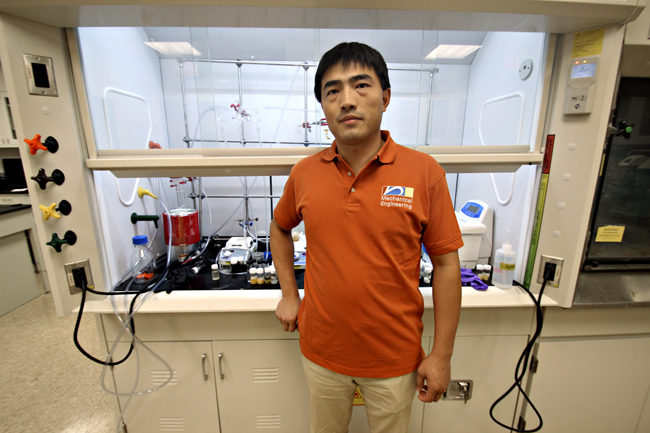A mechanical engineering professor at the University was named to Massachusetts Institute of Technology’s list of “35 Innovators Under 35.”
Guihua Yu was recognized last week on the list, which works to advance society through novel technological creations and applications, according to the list’s website. The list has also named notable innovators in the past, such as Facebook founder Mark Zuckerberg and Google founders Larry Page and Sergey Brin.
“This is not only a great honor for the [research] group members but also a valuable recognition for the engineering scientific works at UT-Austin,” said Borui Liu, a graduate student who works in Yu’s research group in the Materials Science and Engineering program.
The work done in Yu’s lab relates to hydrogels, which are networks of hydrophilic polymer chains that are highly absorbent and possess a degree of natural flexibility — much like human tissue. According to Yu, hydrogels have been used as a mechanism in drug delivery and as scaffolds for tissue engineering in the past, but the utility of these materials has been limited.
“Due to the intrinsic insulating properties, hydrogels are rarely useful for electronics and energy-related applications,” Yu said.
The recognition from MIT was prompted after Yu’s research group created a hydrogel with a new nanostructure design that can transmit and store electricity.
“We would like to witness our conductive hydrogels to be put into use in a variety of daily-life applications, such as lithium-ion battery and supercapacitor electrodes, biosensors and drug delivery devices,” Liu said.
This year’s edition of the list brought Yu’s research group and its work prominence in scientific literature, and a variety of large technology companies have been in contact about the future applications of conductive hydrogels.
According to Yu, increased funding may come in light of the list’s recognition, as well as future research in the field of conductive hydrogels both at UT and elsewhere.
“Knowing the interesting applications we demonstrated will attract more researchers to push together and make more exciting discoveries,” Yu said.















